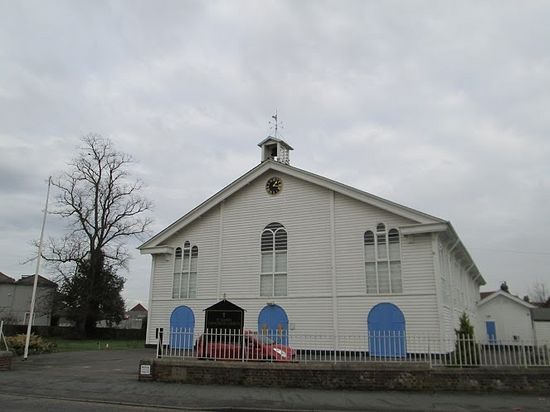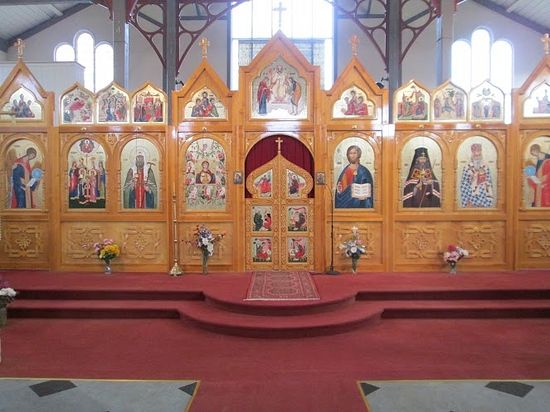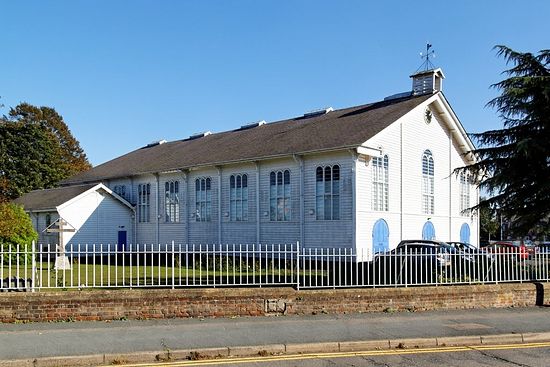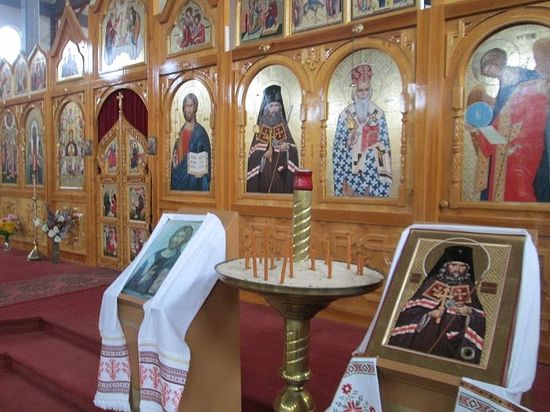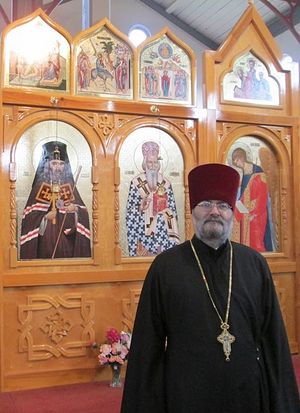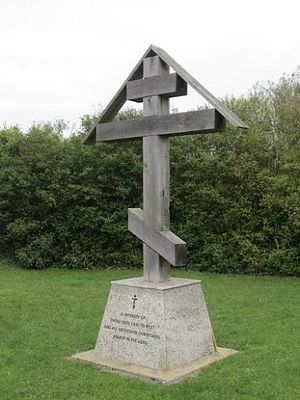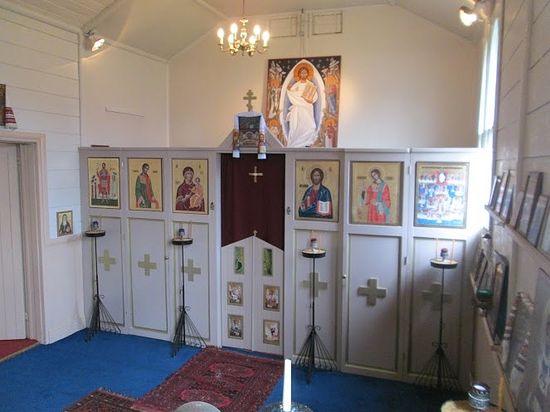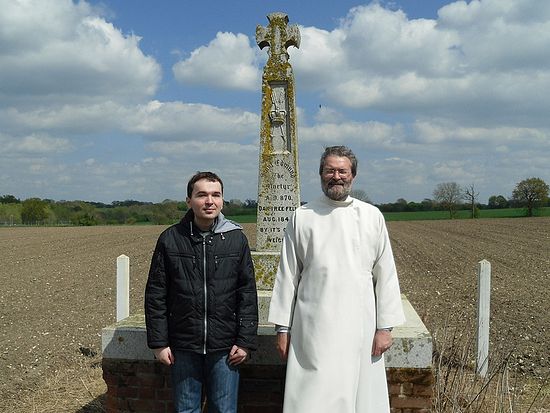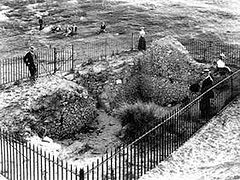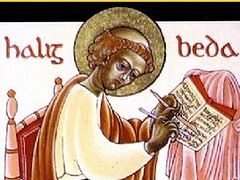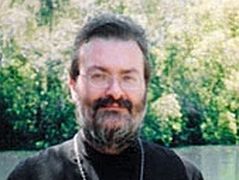Archpriest Andrew Phillips, an Orthodox Englishman, lives in the town of Felixstowe on the east coast of England, county Suffolk. He serves as Rector of the Church of Saint John of Shanghai, the Wonder-Worker, in the town of Colchester, county Essex, which belongs to the jurisdiction of the Russian Orthodox Church outside of Russia (ROCOR). For many years Father Andrew has been a permanent author of the Pravoslavie.ru and OrthoChristian.com websites.
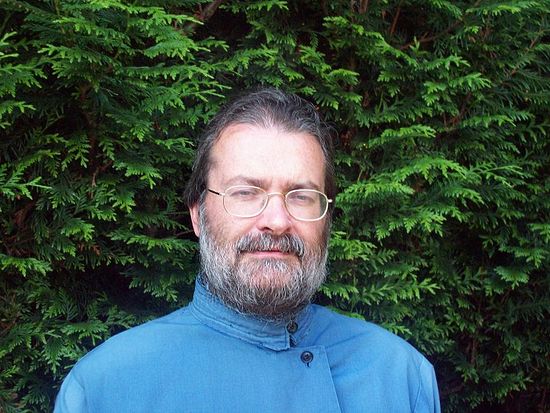 Archpriest Andrew Phillips
Archpriest Andrew Phillips —Father Andrew, about eight years have passed since the Act of the Canonical Communion between the Moscow Patriarchate and the Russian Church outside of Russia was signed on May 17, 2007. What has changed for you since that time?
—In daily life, locally, nothing at all has changed, we are still exactly the same, still simply the local Russian Orthodox Church. However, inside ourselves, things are much better because whereas before we felt isolated, now that we are in canonical communion with the Centre, with the Church inside Russia, we feel stronger, less isolated. To be part of the 500 churches in ROCOR is good, but to be part of the 30,000 plus churches in the rest of Holy Rus’ is much better. To be together and to be free is always better than being alone. Isolation was something that we never wanted, but was forced on us by political circumstances. Heterodox also respect us more now because they know of the Church inside Russia and our Patriarch. We are much stronger together. It is also always a delight for me to welcome pilgrims from Russia, from Moscow and St Petersburg. This would not have happened before.
—Please, tell us about your parish.
—Our situation is quite different from the average parish in Russia.
First of all, there is the question of architecture. Although our church is a white, wooden building, not unlike some Orthodox churches, in fact it used to be the Garrison Church of the British Army in Colchester, a military town 80 km north-east of London. Sadly, the British Army no longer needs big churches. A sign of the times. We bought our church, 650 square metres in size and built in 1855 for soldiers to fight in the anti-Russian Crimean War, seven years ago, thanks to the generosity of those who donated to us through an internet appeal. We converted the building for Orthodox use and the iconostasis was painted for us in Moldova. It is very important that a converted church building should look and feel like an Orthodox church. Apart from the main church dedicated to St John of Shanghai, the Apostle of the Diaspora, we also have a chapel with an altar dedicated to All the Saints of the British Isles and Ireland.
A second difference is our parishioners and where they live. Although we have 600 regular parishioners personally known to me, which is many by the standards of most churches outside Russia, this does not mean that they all come to church every Sunday. First of all, parishioners come mostly by car and from a large area, up to 100 km away. There are so few churches in the West that in fact we have regional churches, so the official legal name of our Church is “the East of England Orthodox Church,” as we effectively cover one of the nine government regions into which England is divided. I spend a lot of time and cover many miles visiting these parishioners.
Thirdly, like many ROCOR churches, our church is multinational. We have 24 different nationalities and we use three main languages in the services, Slavonic, Romanian and English. English is the common language and the language spoken best by the children. Apart from myself, we have a Romanian deacon, who is married to a Russian and who helps us a lot with our Romanian parishioners. There may be four or five nationalities just among the altar servers. On any Sunday you may hear English, Bulgarian, Lithuanian, Greek, Russian, Romanian, French or Italian being spoken after the service.
Finally—and this may surprise many of our readers—our parishioners are young, virtually all under 40. For example, last year we had 49 baptisms, 4 weddings and 0 funerals. In fact our last funeral was in 2009. We run a Sunday school in our classroom and there is also a Russian and Ukrainian school associated with the Church. On great feasts, say, at Easter, Christmas and on our patronal feast, we have a common meal for parishioners in the parish hall. At Christmas the children also perform a Nativity play and afterwards, miraculously, Ded Moroz (Grandfather Frost) appears.
I am also the Orthodox prison chaplain for the two local prisons. So I spend two days a month in prison.
—We know that your church is the largest Orthodox church building in all England: with God’s help you managed to buy its disused building in 2008. But not many Orthodox communities in England, which are increasing in number, have their own church buildings. Where do they perform their services?
—Fortunately, in the ROCOR Diocese in the British Isles, which has existed for 85 years, we all have our own churches, but in most of the smaller, newly-established communities and parishes of the newer Sourozh Diocese of the Church inside Russia they have to use and rent Anglican and Catholic premises on Sunday mornings. Many of these communities are tiny—sometimes only ten people attend.
—Father Andrew, do you see any noticeable increase in the number of practising Orthodox Christians in England? Have many native English people become Orthodox lately? According to the statistics, Orthodoxy is one of the fastest-growing religions in Western Europe.
Yes, we are growing—but by immigration, especially from Romania, Bulgaria and the Baltics, which are all in the EU. If all the local Orthodox came to church, then we would have thousands of parishioners. Unfortunately, fewer than 10 percent of Orthodox actually come to church. As regards Western people who come to Orthodoxy, regardless of nationality, their numbers have always been very small ever since English people began joining the Orthodox Church, basically in the 1950s. On average in our parish we receive one English person a year into the Church. I would say that over the last fifty years on average 50-100 English people a year have joined the different dioceses of the Orthodox Church throughout the country. This is very small numbers. Over 50 years this makes only 2,500 - 5,000 people in all.
The situation is very similar in other Western countries—only small numbers come to Orthodoxy. Western people find it very difficult to put our Orthodoxy above Western culture with its rationalism and humanism. In any case, the most important question that we have to ask is not how many Western people join the Orthodox Church, but how many remain in the Church and do not fall away. Some jurisdictions receive many English people, but they nearly all fall away. In ROCOR we are careful about whom we receive and prepare them cautiously. Quality, not quantity.
—What is the difference between the parishes of ROCOR and parishes abroad that are under the Moscow Patriarchate?
—Sometimes little, at other times big. In general most of the parishes of the Patriarchate are very new and cater mostly to those who have left the former Soviet Union in the last few years. ROCOR parishes are much older, sometimes nearly 100 years old, they are much more mixed, often bilingual, and are often well adapted to life abroad and missionary work, since we generally understand the local culture better than those who have only just come here.
Thus, many questions that are new to Patriarchal parishes are old ones for us. For example, we came to conclusions about the question of ecumenism 40 years ago at the Third All-Diaspora Council in 1974. So a question like ‘Does ecumenism have a future?’ is irrelevant to us. For us, of course not, ecumenism only has a past. We do not at all believe that the Orthodox Church is one of many ‘Churches’—there is only one Church, the Orthodox Church. However, we also firmly believe in friendly, good neighbourly and charitable relations with other Christians and we have many parishioners who are in mixed marriages. Good relations with others are the norm. As the English proverb says: You are more likely to catch a fly with a spoonful of honey than with a spoonful of vinegar.
—What is essential in order to survive as Russian Orthodox outside Russia?
—The essential thing is to keep our spiritual integrity, whatever our nationality and whatever the language we use in Church services, not merging with the political Establishments of the countries where we live. This is not always done and some Orthodox fall into the temptation of conforming to the world, to the local Establishments. If they live in countries with a Roman Catholic cultural background, like France, they may start resembling Uniates; if they live in countries of a Protestant cultural background, like the UK or the US, they may start resembling Protestants.
We may be snubbed, ignored and despised because we refuse to be part of the Establishment, but we do not compromise. The Faith must not lose its savour through conformism to this world because that is apostasy from the Faith. Only last week we had the case of a very Protestantized priest in one Orthodox jurisdiction in the USA who publicly denied that the Orthodox Church is the One, Holy, Catholic and Apostolic Church. Such errors just create scandal among the faithful.
This compromise with the political Establishment was the problem in England with the Sourozh schism of 2006. The same problem lies behind some in the Paris Exarchate in France who refuse any return to the Russian Church, justifying themselves with reference to secularism of the French Establishment. Our Faith must always come before our culture because our culture is transfigured, made Christian, only by our Faith. The Church does not conform to the world—the world conforms to the Church.
The same problem happened with several hundred individuals who left ROCOR in various countries in 2007 because they did not agree with the reconciliation between the Church Outside Russia and the Church inside Russia. Highly politicized, they had developed Russophobic attitudes… As a result they left the Church and joined sects. But there is no greater tragedy than to die outside the Church, which is what is happening.
—What are the greatest problems living outside a traditionally Orthodox country as a small minority?
—I would say there are two apparently diametrically opposed problems.
Firstly, there is a practical difficulty, which comes down to a lack of money. Unlike in Russia, we have no monasteries—which is always disastrous—we have no property, no ready-made churches, no ready-made priests and choir directors and no masses of Orthodox or sponsors who can give financial support to a church, to buy or rent a building for conversion to Church use, to furnish it and to pay the priest a salary. Many of our clergy have to work in secular jobs, unless they are pensioners, simply in order to survive. This is bad for liturgical life—the church buildings cannot remain open all day long, even if they belong to us, because the priest is at work. And even if the church building is permanent and belongs to us and a priest is present, who is going to sing? Those who know how to sing have to work as well. If there is no money to pay the priests, then there is no money to pay choirs either.
In the West we lack all basic infrastructure and most of our faithful are quite poor. As a result, young men do not want to become priests—and their parents do not want them to become priests—because they know that it means a life of poverty and exhaustion, without support. We say: In Russia the churches pay for the priests, but in the West the priests pay for the churches.
Secondly, there is a spiritual difficulty. Where are our modern saints? Why does it seem to be easier to produce saints on Mt. Athos, in Greece, in Romania, in Russia? Some may point to the very weak Orthodox monastic life in Western countries as a reason. No doubt that is very important, but there is still a general problem. Temptations in the West are such that saints are not produced. Take even St John of Shanghai, the saint of the Diaspora. The seeds of his holiness were sown in the Russian Empire, in Serbia and Macedonia—not in the West. We have not yet produced a saint born and bred in the Western world. The last saints produced here lived a thousand years ago. It would be easy to say, “Well, what do you expect, the Western mentality is ‘saint-proof’, it is ‘anti-holiness’.” But to my mind that sounds like an excuse. Look at how many saints the pagan Roman Empire produced. Why can’t we?
I believe that these two problems are connected. Where there are no saints, the Church cannot prosper, either spiritually or financially. Where there are saints, there the crowds of pilgrims gather—look at St. Paisius of Mt. Athos—and the Church is able to build new churches, equip them, pay clergy, found monasteries. The Church is Holy. Without holiness, there is no Church, it is just an organization, an administration, at worst a national club or museum of folklore. Holiness is the barometer of the Church’s health.
Look at contemporary Russia. The wave of Church building and baptism over the last 25 years has been because of the sacrifices of the New Martyrs and Confessors. The Church is founded on holiness. No saints, no Church. And the proof of this is in the Protestant denominations, which have no saints, which deny saints and so are dying out. Sadly, over the last fifty years Catholicism has gone the same way as Protestantism—a fact which always shocks Catholics from Eastern Europe, who are much closer to Orthodoxy than Western Catholics.
—What is the situation with other Orthodox jurisdictions represented in Britain? We should remind our readers that, in addition to two dioceses of the Russian Church, there are dioceses (or, at least, parishes) of the Patriarchate of Constantinople, the Church of Antioch, the Serbian, Romanian and other Local Orthodox Churches in England.
—As everywhere in the Western world, seven Local Churches are present here: the Patriarchate of Constantinople, the Romanian, Serbian, Bulgarian and Georgian Churches, the Patriarchate of Antioch and the Russian Orthodox Church. Until recently the Georgian and Bulgarian parishes did not even exist and the Romanians had only one church in London, but with immigration they are increasing rapidly. In general only the Russian Church is multinational. Thus, the Georgian, Bulgarian, Romanian and Serbian parishes cater mostly to their national immigrants, to one nationality.
The same is basically true of the local Greek Archdiocese of the Patriarchate of Constantinople. As in other Western countries the Greek Archdiocese is still the biggest diocese in this country, consisting mainly of immigrants from Cyprus who settled here in the 1950s and 1960s. However, the Greek Archdiocese also contains some former Anglicans like Metropolitan Kallistos Ware.
As for the small Antiochian Diocese, it is very unusual because apart from one Arab church in London, its parishioners are mostly ex-Anglicans. It is formed of a number of very small communities, about 20 in number, with over 300 parishioners in all. Their clergy are ex-Anglican priests, some of them did not agree with Anglican women-priests. The unusual thing is also that they sing Russian melodies at their liturgy, yet they use the new calendar like the Greeks.
Most of the parishes or communities in all these various jurisdictions hold services in Anglican churches, though the Greek Archdiocese bought many unused Anglican churches in the 1950s and 1960s, when they were very cheap to buy, and converted them for Greek use. Only ROCOR has actually built churches in England.
—As a person who once lived in France for 15 years, what can you say regarding the attack on the Paris offices of the weekly newspaper Charlie Hebdo on January 7 this year?
First of all, I feel sorry for the victims of these murderous psychopaths. Most of them died, it seems, without time for repentance. Charlie Hebdo is well-known in France for its anti-Christian and anti-Muslim blasphemies and pornography, but that is no reason why we should not condemn this terrorist outrage.
However, I also feel sorry for Muslims. They are suffering for two reasons. First of all, their Faith had been outraged by Charlie Hebdo. Now they are being outraged by people who think that all Muslims are murderous terrorists. The reactions of Western leaders were very clear. They had not a word in favour of religion, only in favour of the freedom to blaspheme and the freedom to publish pornography, that is, the “freedom” to hate God and to hate one’s neighbour. Have they never heard the word “respect” or know the concept of “God”? To say “Je suis Charlie” (I am Charlie) is equivalent to saying “My soul is dead.”
It may seem strange to some to read that an Orthodox priest defends Muslims, but I am not alone. We have heard the words of bishops in Serbia, Greece and Russia saying the same. We obviously have different beliefs from Muslims, but we have to respect one another. And we are in many ways closer to each other than we are to Western secularists. Blasphemy is a deliberate provocation. There is no need for that. All of this shows that the West has lost all concept of the two fundamental commandments—to love God and to love our neighbour. If the West obeyed these commandments, it would not blaspheme and it would have respect for others. This lack of love explains why Western leaders suffer from such astounding hypocrisy and self-delusion. They actually believe in their own propaganda…
—What do you think of the situation in the Ukraine? Why do you think these tragic events have happened there?
This war is pure tragedy. Although the fighting is largely between Greek Catholics and Orthodox, it is still a civil war, where brother Slavs are killing brother Slavs. This is to the delight of Satan, who loves all human suffering and especially loves it when brothers kill brothers. Of course, the political situation is very difficult. The Ukraine as it is today is a country made up of parts of Western Russia, part of Eastern Poland, a little bit of Romania and Hungary and most of Carpatho-Russia, which Kiev insists on calling Zakarpat’e. But these different parts could have lived together in peace and unity—the tragedy has come with foreign political intervention. At every liturgy we pray for the Ukraine and its people, as Patriarch Kirill has asked us to.
This is the third time in forty years that part of the Orthodox world has been eaten. The first time was in Cyprus in 1974, when Turkey invaded it. The second time was in Serbia, when Kosovo was occupied. Who is to blame? It is no good blaming others. We so-called Orthodox are ourselves to blame. I remember Cypriots from the Turkish-occupied part of Cyprus talking to me in 1974 complaining how the Turks had taken their churches. I asked them if they had been to these churches and they said “no,” they never went to church.
The same thing in Serbia. I have met so many Serbs who tell me that they are Orthodox, and yet when I ask them why they do not come to confession and communion, they answer “because I am not baptized,” which they refuse to do. Unbaptized Orthodox! As for the Ukraine, most are baptized, but how many are actually Orthodox; I mean, how many attend the canonical Church at least once a month, and not a nationalistic schism like the Greek Catholics or the Philaretists? I think that it is not many, a small minority.
If we do not go to Church, except when we have some crisis in our lives, how can we say that we are Orthodox? If our churches are empty, then God will take away our churches because we are unworthy to have them. And when we Orthodox no longer have churches, what are we? Nothing! The Church is the source of our culture, of our civilization. Without the Church we will gradually descend into barbarianism. This we can see in the West today, which is making that descent. Even 25 years ago, we could not have imagined that phrases like “single sex marriage” could even exist. It would have been taken as a joke in poor taste. But today…The West is our future if we abandon the Church. The choice is in our hands.
It is no good us Russian Orthodox saying, “It cannot happen here.” Remember the Tower in Siloam. “Except ye repent, ye shall all likewise perish.” (Luke 13, 4-5). If we do not go to Church, at least attempt to live a Church life, the same thing will happen to us, our children and grandchildren. Sometimes middle-aged Russians come to church and complain to me about their children, now grown into adults and are living badly. I always ask them: “And did you bring them to church when they were little, did you bring them to communion every week, did you teach them any prayers, did you pray at home?” And of course usually they answer something like: “No, but we came to church once a year at Easter for half an hour and lit a candle.” I look into their eyes and then they understand their mistake. And they have tears in their eyes. But it is too late.
Without the Church both national life and personal life fall apart. Nearly 2,000 years ago the Evangelist wrote down that Satan is the prince of this world. Surely, it is all clear. If we do not embrace the Church, then we embrace Satan. You don’t need to read books or have a doctorate to know that. What can be clearer?
—How do you see the future of Orthodoxy in Western Europe? More than once in your articles and books you express the hope that despite all the current negative processes the spiritual uplift and even the restoration of Orthodoxy in Europe are still possible, especially through the prayers of thousands of local saints, shone forth in these lands before the great schism. How do you think this miracle will be possible?
From my own experience of communication with Englishmen and other European residents, it can be said that in Europe there are still quite many people who are keeping the traditional values, and a large number of Anglicans and other non-Orthodox Christians treat Orthodox with respect and show interest in them. In very many Anglican cathedrals and even parish churches today you can see Orthodox icons (this was not the case even ten years ago), numerous ancient shrines are being restored from ruins, and feasts to local pre-Norman saints are celebrated in cathedrals. I heard that at the enthronement of the present Archbishop of Canterbury, Justin Welby, the Creed was read without Filioque—this alone is already an event! English people themselves are beginning to write and publish books on their ancient saints and shrines. And not long ago Archbishop of Westminster Vincent Nichols noted that the Reformation in England had ended in 1990s…
—Everything is possible. Europe, it seems, is on its death-bed, but we believe in repentance, even on our death beds. On the one hand, Europe seems to be rushing into the abyss, on the other hand there are small, patriotic Christian minorities, spiritually healthy forces, in every European country, who sympathize with Russia and Russian Orthodoxy and our values, which are also the values of the real Western saints of the first millennium. We Russian Orthodox must support all spiritually healthy forces in Europe and worldwide. Some even now look to us for that support. Our Church should be a beacon to all humanity that searches for spiritual life. True, these spiritually healthy groups are only small minorities and we should not get an over-optimistic picture. Humanly speaking, the situation is nearly hopeless. But we are Orthodox—we believe in the power of the saints, ancient and new, Eastern and Western, in the grace of God, in the Holy Spirit, to transfigure foolish humanity.
In moments of despondency, I remember the words of St. Seraphim of Vyritsa, said at one of the darkest moments in the history of the Russian Church. He prophesied that the time would come when Western people would sail to St. Petersburg in ships to get baptized. People thought he was mad. But you will see—he was right.
—Finally, what are your wishes for our readers in Russia?
I would like readers not to despair at the difficulties of daily life in Russia, at rising prices, at Western sanctions, at the many wars, at the events in the Ukraine and in the Western world. Never give up! Look how the blood of the New Martyrs and Confessors conquered atheism. With God all things are possible. Remember St. Alexander Nevsky who said: “God is not in the power, but in the truth.” Remember the words from the Psalms: Who is so great a God as our God? Thou art the God who workest wonders! Many remarkable things will happen in the coming years.
Thank you very much for your interesting interview, Father Andrew! We wish you abundant blessings of the Lord and His help in all your labors!

